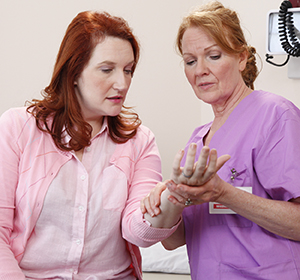Understanding Hives (Urticaria)
Understanding Hives (Urticaria)

What causes hives?
Hives can be caused by food and beverages such as:
Tree nuts (almonds, walnuts, hazelnuts)
Peanuts
Eggs
Shellfish
Milk
Hives can also be caused by medicines such as:
Antibiotics, especially penicillin and sulfa-based medicines
Anticonvulsant or antiseizure medicines
Chemotherapy medicines
Other causes of hives include:
Infection or virus
Heat
Cold air or cold water
Exercise
Scratching or rubbing your skin, or wearing tight-fitting clothes that rub your skin
Being exposed to sunlight or light from a light bulb, in rare cases
Inhaled-chemicals in the environment from foods and drugs, insects, plants, or other sources
In some cases, hives may occur again and again with no specific cause.
If you have hives
Stay away from the food, drink, medicine, or other thing that may be causing the hives.
Ask your healthcare provider how to control itchy or irritated skin.
Talk with your healthcare provider right away if you think a medicine gave you hives.
Watch for anaphylaxis
If you have hives, watch for symptoms of a severe reaction that can affect your entire body. This is called anaphylaxis. Symptoms can include swollen areas of the body, wheezing, trouble breathing or swallowing, and a hoarse voice. This reaction may happen right away. Or it may happen in an hour or more. In extreme cases, the airways from mouth to lungs may swell and make breathing difficult. This is a medical emergency. Use epinephrine medicine if you have it, and call 911 or go to the emergency room.
When to call your healthcare provider
Call your healthcare provider if:
Your hives feel uncomfortable
You have never had hives before
Your symptoms don't go away or come back
Your symptoms get worse or new symptoms develop such as:
Sneezing, coughing, runny or stuffy nose
Itching of the eyes, nose, or roof of the mouth
Itching, burning, stinging, or pain
Dry, flaky, cracking, or scaly skin
Red or purple spots
Call 911
Call 911 right away if you have:
Swelling in your lips, tongue, or throat, called angioedema
Drooling
Trouble breathing, talking, or swallowing
Cool, moist or pale (blue in color) skin
Fast and weak heartbeat
Wheezing or short of breath
Feeling lightheaded or confused
Diarrhea
Severe nausea or vomiting
Seizure
Feeling dizzy or weak, or a sudden drop in blood pressure
Updated:
August 15, 2018
Reviewed By:
Blaivas, Allen J., DO,Image reviewed by StayWell art team.,Pierce-Smith, Daphne, RN, MSN, CCRC